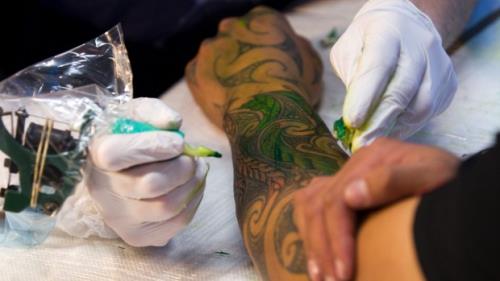Employers must use judgment and sensitivity when dealing with tattooed staff
10 November 2015

Even the more worldly readers will have been a little shocked by the underbelly of party life in Blackpool, England.
Local media reported that a Welsh reveller had a pair of Ray-Ban sunglasses tattooed on his face during a stag-do.
The man, who asked not to be named, woke up the morning after and thought that his friends had drawn around his eyes with a marker pen. He could not wash the marking off and realised that it was a permanent tattoo.
Despite the stares, he got used to the tattoo and initially he decided to keep it. However, fearing he would embarrass his family and friends, he sought the removal of the sunglasses tattoo.
He made no mention of how his employer responded. The Welshman has undergone treatment for two years and the tattoo has now been removed, with the exception of some turquoise markings which are expected to clear.
What would New Zealand employers think if an employee arrived at work with a tattoo like the Welshman's after a bender? And even if they didn't like it could they do anything about it?
Any case would need to be decided on general principles. The most relevant principle being that an employer has a right to give an employee reasonable and lawful instructions.
On the one hand it is accepted that an employer can set standards of dress and appearance. Whether this standard is reasonable may depend on the nature of an employee's work.
If an employee works on a chain at a meat works, where low standards of dress have been tolerated, an employer would arguably be acting unreasonably if they took exception to an employee's tattoo.
But an employee who was the public interface of an embassy in Wellington for instance, or who works in one of the traditional professions, may find that the employer takes a different attitude.
The permanent nature of tattoos could make it unreasonable for an employer to require an employee to remove their tattoo.
A more reasonable instruction would be to require that the tattoo is covered. However, in the case of our drunken Welshman this too may be difficult.
Another factor to consider is the place tattoos occupy in the different cultures of New Zealand.
Moko (tattoos) for many Maori are a significant and treasured expression of their culture, far from the example seen in the case of the drinking Welshman. Would it be reasonable for an employer to require a moko to be covered or removed?
That issue has made its way to our courts.
Claire Haupini was in the business of catering for social functions. Haupini would help prepare for the function, serve, and clean up after functions. It was a frontline role and she had direct contact with the company's clients.
Haupini had a moko on her left forearm. When first employed she was issued with a standard three quarter length shirt which all but covered the moko. She was comfortable with this as all employees were required to wear one. The next year the company issued new short sleeved shirts which exposed all of her moko.
The company suggested that she should wear the old uniform which covered the moko. She obliged, but was upset by the request. Given her status as a casual worker she declined to work again. She later claimed she was discriminated against on the basis of her race.
Her case failed in the Human Rights Review Tribunal.
To succeed Haupini was required to show that Maori would be disproportionately affected by the request to cover the tattoo.
The tribunal considered that many non-Maori may suffer similar detriment by being required to cover their tattoos and there was insufficient evidence given by Haupini to show that Maori would be disproportionately affected.
However, the tribunal did not rule out this possibility in other cases and the issue may one day be heard again.
The tribunal observed that there may have been a rational business related reason for covering up the tattoo.
One hopes party life in New Zealand is more traditional and less challenging that the risks of partaking in a stag weekend in Blackpool. And if a tattoo does emerge employers need to use judgment and sensitivity. If employers want tattoos to be covered they must have a good reason.


